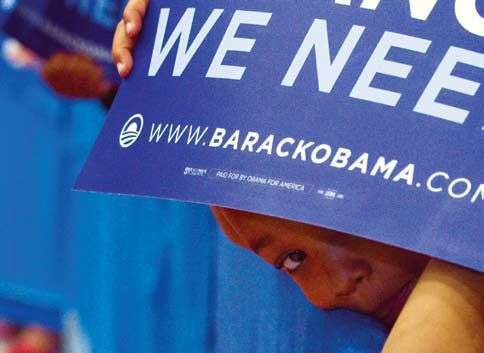An Open Letter to President-elect Obama
Illustrator: Barbara Miner

Dear President-elect Obama,
Congratulations on the success of your remarkable campaign. Your election as the first African American president in a nation founded on slavery and only a few generations removed from legal segregation is a historic triumph for democracy and racial justice. The hope that greeted your election throughout much of the country and the world resonated loudly in the nation’s schools.
Your historic victory and the increased mandate for change in Congress open up possibilities for serious changes in federal education policy. For progressive educators and advocates, we were excited to hear you state early in your campaign that “it’s time to stop working against our teachers and start working with them. Teachers don’t go into education to get rich… They want our children to succeed, but we’ve got to give them the tools. Invest in early childhood education. Invest in our teachers and our children will succeed.”
Schools are built on hope: hope for our children, hope for our future, hope for the possibilities of human potential, both individual and collective. But like economic justice, the environment, and peace among nations, schools have been under relentless attack these past eight years. Federal education policy has been fashioned into a stick to abuse what is perhaps our society’s most inclusive democratic institution. “Test and punish” accountability imposed from Washington, D.C., has used academic achievement gaps to systematically label schools as failures without providing the resources and strategies to eliminate the gaps.
We know that the road forward to improving the nation’s public schools will be complex and difficult. We also know that discussion about any major change must include various stakeholders. We at Rethinking Schools plan to contribute to those discussions of school “change” policies through an increase in our coverage of various reform initiatives and proposals. We invite our readers to write to us and for us about a wide range of educational issues including accountability, assessment, funding, choice, school-based reform, teacher retention, teacher union strategy, inequality, and the content of classroom curriculum.
Mr. President-elect, in forming an education policy, your administration ought to connect education to the broader social and economic conditions under which children live. How can children hope to succeed in school if they are hungry, if their parents aren’t working or are considered “illegal,” if they are chronically ill, or if the home is cold?
The correlation between social class and student achievement is well-known. For example, in the journal The Future of Children, Columbia University professor Janet Currie found that differences in maternal health — including maternal depression — could explain why some young black children struggle in early childhood. In the Journal of Public Economics, three researchers, using data from Texas, estimated that frequent changes in residences — a phenomenon seen among children of unemployed or underemployed parents — explained about 14 percent of the black-white achievement gap and an 8 percent difference between children from low-income families and others. The 2006 Campaign for Children’s Health Care report found that 9 million children lack health insurance — children who will have unmet needs, from regular checkups to dental care to prescription medication. It clearly shows the depth and breadth of the crisis. The issue isn’t so much the “soft bigotry of low expectations,” but rather the hard bigotry of institutional poverty.
For too long, the discussion of poverty has been cut out of the school reform debate. It’s as dangerous as a doctor making a diagnosis on a patient’s condition without looking at any and all environmental factors that affect the patient.
As we as a society address this issue of poverty, we fully recognize that educators and local communities need to simultaneously mobilize using their limited resources to better serve the children. Rethinking Schools has never hesitated during our 22 years to be critical of policies and practices within public schools that harm students’ education, whether through tracking and segregation or dumbed-down scripted curriculum.
Change in school should be promoted through programs that give educators and families the time and resources necessary to create real “learning communities” — revitalized schools in beleaguered neighborhoods that are centers of renaissance and organizing. Conditions of teaching and learning should change so that educators have quality professional development, time to do in-depth assessments of their students’ learning, and a reasonable student load to enable genuine collaboration with their peers and their students’ parents. Students — not just those in affluent suburbs — should have access to robust and challenging learning opportunities including a full complement of arts education, and rigorous physical and health education, as well as a rich academic curriculum that helps them understand, interrogate, and become active participants in the complex world they are to inherit.
If you discard the old top-down, test and punish education reform playbook for something that serves the needs of families and educators, you won’t find yourself alone. You will find many teachers, parents, community activists, union reformers, progressive academics, and civil rights advocates ready to help our schools change for the better and live up to their promises of equal opportunity for all.
It’s time to listen to them and to students themselves who were ignored by the previous administration and pummeled by right-wing demagogues who want schools to advance the tenets of market fundamentalism.
It’s time to have straightforward discussions on fixing this country’s broken system of funding schools, as well as reconstructing crumbling infrastructure and innovating the substandard technology backbone in urban districts. We’ve bailed out banks and airlines, spent billions destroying and then attempting to rebuild Baghdad and Kabul. The last eight years can’t have been the best we could do for education.
Splitting from the past years of attacking teachers, students, and parents for underperforming schools will take political courage. Yet charting a more honest path to education reform will signal to many Americans that you truly are an education president.
In your speech the night you were elected, you said this was our moment. “This is our time — to put our people back to work and open doors of opportunity for our kids; to restore prosperity and promote the cause of peace; to reclaim the American Dream and reaffirm that fundamental truth — that out of many, we are one.”
It is our wish and great hope that public education will finally have its moment in the 21st century to be a testament to ideals of equality and justice.

